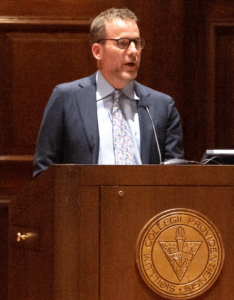Tag: harvard
Making the (Business) Leaders of Tomorrow: Humanities Forum Preps Students for Working World
by The Cowl Editor on February 6, 2020
Campus

by Eileen Cooney ’23
Assistant News Editor
On Jan. 31, Duff McDonald came to speak at the Humanities Forum about his book The Golden Passport: Harvard Business School, the Limits of Capitalism, and the Moral Failure of the MBA Elite. The title of this book comes from a New York Times article in 1978 that glorified an MBA from Harvard University as the golden passport to an upperclass life. McDonald’s entire talk refuted this claim and expounded upon the horrible consequences that have resulted from Harvard Business School’s curriculum.
McDonald began his talk by giving some background: he has a business degree from the Wharton School of Business at the University of Pennsylvania and he worked at Goldman Sachs for three years, a job that he left to pursue a career in journalism. McDonald has written three other books, including The CEO: An Interactive Book and The Firm: The Story of McKinsey and Its Secret Influence in American Business.
Until McDonald wrote his exposé of the Harvard Business School, all of the books about the institution were written by insiders or faculty members with overly positive views. Upon conducting research for the book, McDonald was shocked by how Harvard’s business curriculum was essentially immoral.
Firstly, one teaching method used at Harvard is The Case Method. This is a conversational approach that asks students to study particular cases about companies and then lead a student discussion about how one would proceed if they were the head of that company.
These first-year students are called upon randomly in class and expected to lead a 30-minute discussion after which their classmates critically evaluate it. Harvard claims that it gives students the ability to judge the parameters of a particular situation without having full knowledge—something that company management is often forced to do. McDonald claims that it teaches students, our future business leaders, to act rashly without concern for the consequences of their actions.
Secondly, Harvard Business School unleashed the Leadership Industry, claiming that it teaches its students to be the next leaders of the business world. In doing so, Harvard Business School failsto acknowledge that managers and leaders are inherently different. Leaders, McDonald argued, are naturally born and cannot be taught. On the other hand, managers are manufactured. The two should not be confused.
Thirdly, Harvard Business School pushes the idea that businesses should be run in the interest of its shareholders above all else. This has, according to McDonald, led to unethical practices by business leaders who act only in the interest of their shareholders. This shift in the curriculum, he claims, cascaded throughout the business world and left us in the place we are today. A place where inequality in America remains very high is in the business world.
When asked to comment on the book, the Dean of Harvard only released one statement about it. He said that a lot was wrong with the book; it did not acknowledge the great things the business school does. He emphasized that he read excerpts.
McDonald ended his talk by asking everyone to really think about the consequences of their actions and to always reflect upon the intentions behind their actions. He offered advice to students, saying that to be successful in the business world “you do not need to join a cult that demands complete obedience.” He also praised a liberal arts education, saying that the only classes “that are going to resonate with you 25 years from now are the liberal arts classes you took.”
